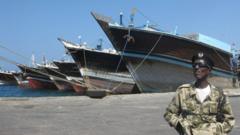The self-declared republic insists the facilities in question belong to them, not to Mogadishu, amidst ongoing tensions regarding territorial rights and international recognition.
**Somaliland Defies Somalia's Port Offer to the US**

**Somaliland Defies Somalia's Port Offer to the US**
Somaliland firmly rejects the Somali government's proposal to transfer control of the strategic Berbera port and airbase to the United States.
In a significant geopolitical development, Somaliland has chosen to stand its ground against Somalia's federal government, which recently attempted to grant exclusive control of the vital port and airbase in Berbera to the United States. This key location on the Gulf of Aden has been a focal point of contention, particularly as Somaliland asserts its independence claims following its declaration in 1991.
Somalia’s President Hassan Sheikh Mohamud, in correspondence with US President Donald Trump, presented additional port and airbase opportunities within Somalia itself, claiming that these assets would bolster US security operations in Africa. However, Somaliland's Foreign Affairs Minister Abdirahman Dahir Aden refuted this offer, branding it as "desperate" and asserting that the facilities belong to the breakaway region.
The new context of US-Somalia relations is intricate, with observers noting that Somaliland residents have been hopeful about the potential recognition from the US, positing that it could become the first country to formally acknowledge their self-governance. Minister Aden took to social media to reinforce this sentiment, suggesting that "nothing" could prevent the impending recognition of Somaliland.
Control of Berbera port is currently under the management of Dubai-based DP World, which strengthens ties with the UAE, a known ally of the US. Minister Aden reiterated, "The USA is not stupid. They know who they need to deal with when it comes to Berbera port", implying that the US understands the complexity of engaging effectively in the region.
Moreover, the backdrop of Somalia's recurring struggles with the militant group al-Shabab adds another layer to the discussion about foreign military engagement. The US has historically provided military support and intelligence in the fight against these insurgents, and there is concern in Mogadishu about losing such support—similar to the cuts seen during Trump’s previous term.
The letter detailing the proposed control of the airbases and ports reiterated the strategic importance of these assets in combating global competitors such as China and Russia within the Horn of Africa. However, questions arise in light of Somalia's federal structure, where regional dynamics, especially with Puntland, may challenge the legitimacy of such unilateral offers from Mogadishu.
The ramifications of these developments extend beyond bilateral relations as previous confrontations over port management in Somaliland saw intervention from third-party nations. Last year, Turkey mediated a dispute involving Ethiopia’s maritime agreements, indicating the high stakes of regional geopolitics.
This ongoing dispute sets the stage for further tensions between Somaliland and Somalia, while also highlighting the broader implications for strategic partnerships and recognition in the region.
Somalia’s President Hassan Sheikh Mohamud, in correspondence with US President Donald Trump, presented additional port and airbase opportunities within Somalia itself, claiming that these assets would bolster US security operations in Africa. However, Somaliland's Foreign Affairs Minister Abdirahman Dahir Aden refuted this offer, branding it as "desperate" and asserting that the facilities belong to the breakaway region.
The new context of US-Somalia relations is intricate, with observers noting that Somaliland residents have been hopeful about the potential recognition from the US, positing that it could become the first country to formally acknowledge their self-governance. Minister Aden took to social media to reinforce this sentiment, suggesting that "nothing" could prevent the impending recognition of Somaliland.
Control of Berbera port is currently under the management of Dubai-based DP World, which strengthens ties with the UAE, a known ally of the US. Minister Aden reiterated, "The USA is not stupid. They know who they need to deal with when it comes to Berbera port", implying that the US understands the complexity of engaging effectively in the region.
Moreover, the backdrop of Somalia's recurring struggles with the militant group al-Shabab adds another layer to the discussion about foreign military engagement. The US has historically provided military support and intelligence in the fight against these insurgents, and there is concern in Mogadishu about losing such support—similar to the cuts seen during Trump’s previous term.
The letter detailing the proposed control of the airbases and ports reiterated the strategic importance of these assets in combating global competitors such as China and Russia within the Horn of Africa. However, questions arise in light of Somalia's federal structure, where regional dynamics, especially with Puntland, may challenge the legitimacy of such unilateral offers from Mogadishu.
The ramifications of these developments extend beyond bilateral relations as previous confrontations over port management in Somaliland saw intervention from third-party nations. Last year, Turkey mediated a dispute involving Ethiopia’s maritime agreements, indicating the high stakes of regional geopolitics.
This ongoing dispute sets the stage for further tensions between Somaliland and Somalia, while also highlighting the broader implications for strategic partnerships and recognition in the region.



















